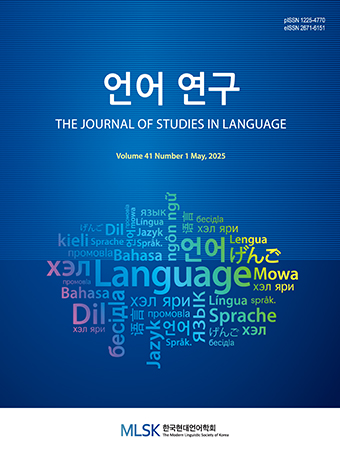Research Article
Abstract
References
Information
The current study aims at investigating the structural relationships between EFL learners’ vocabulary knowledge and their vocabulary learning strategy use depending upon their level of vocabulary knowledge. For the study, 1,124 high-school students were divided into two groups according to their vocabulary knowledge. The results showed that there were significant differences in the students’ vocabulary learning strategy use according to their vocabulary knowledge, and that three factors for high-level students (context use, repetition in writing, and learning range of words) and two for those in low level (meaning checking and learning range of words) had direct influence on the enhancement of their vocabulary knowledge, and other factors in each level exerted indirect influence through the direct factors. Teaching implications are discussed.
-
1.
- 배태일. 2014. 영어 어휘 학습 전략과 영어 어휘 성취 사이의 구조 관계 분석. 『영어교육연구』 26.4, 191-208. 2.
- 이성원 ‧ 민미옥. 2016. 한국 고등학생들의 영어 어휘학습책략 사용연구. 『영어교육』 61.2, 115-137. 3.
- Chamot, A. U. 2005. Language Learning Strategy Instruction: Current Issues and Research. Annual Review of Applied Linguistics 25, 112-130.10.1017/S0267190505000061 4.
- Chin, C. and C. Yook. 2016. Beliefs and Strategies of College EFL Students for Vocabulary Learning. English Language & Literature Teaching 22.3, 1-33. 5.
- Chon, Y. and Y. Kim. 2011. Lexical Discovery and Consolidation Strategies of Proficient and Less Proficient EFL Vocational High School Learners. English Language & Literature Teaching 17.3, 27-56. 6.
- Coxhead, A. 2006. Essentials of Teaching Academic Vocabulary. Boston, MA: Heinle, Cengage Learning. 7.
- Day, R. and J. Bamford. 1998. Extensive Reading in the Second Language Classroom. Cambridge: Cambridge University Press.10.1177/003368829802900211 8.
- DeCarrico, J. 2001. Vocabulary Learning and Teaching. In M. Celce-Murcia (ed.), Teaching English as a Second or Foreign Language. Boston, MA: Heinle & Heinle, 285-299. 9.
- Elley, W. 2001. Literacy in the Present World: Realities and Possibilities. In L. Verhoeven and C. Snow (eds.), Literacy and Motivation: Reading Engagement in Individuals and Groups. Mahwah, NJ: Lawrence Erlabum Associates, 225-242. 10.
- Gass, S. 1988. Second Language Vocabulary Acquisition. Annual Review of Applied Linguistics 9, 92-106.10.1017/S0267190500000829 11.
- Gass, M., J. Behney, and L. Plonsky. 2013. Second Language Acquisition. New York: Routledge.10.4324/9780203137093 12.
- Gu, P. Y. and R. K. Johnson. 1996. Vocabulary Learning Strategies and Language Learning Outcomes. Language Learning 46.4, 643-679.10.1111/j.1467-1770.1996.tb01355.x 13.
- Halbach, A. 2000. Finding Out about Students’ Learning Strategies by Looking at Their Diaries: A Case Study. System 28, 85-96.10.1016/S0346-251X(99)00062-7 14.
- Horwitz, E. K. 1988. The Beliefs about Language Learning of Beginning University Foreign Language Students. The Modern Language Journal 72.3, 283-294.10.1111/j.1540-4781.1988.tb04190.x 15.
- Huh, J. 2009. Vocabulary Learning Strategy Use and Vocabulary Proficiency. English Language & Literature Teaching 15.4, 37-54. 16.
- Jeon, I. 2007. The Relationship between Korean EFL Learners’ Vocabulary Ability and Vocabulary Learning Strategies. English Teaching 62.1, 31-54.10.15858/engtea.62.1.200703.31 17.
- Kojic-Sabo, I. and P. M. Lightbown. 1999. Students’ Approaches to Vocabulary Learning and Their Relationship to Success. The Modern Language Journal 83.2, 176-192.10.1111/0026-7902.00014 18.
- Lai, Y.-C. 2009. Language Learning Strategy Use and English Proficiency of University Freshmen in Taiwan. TESOL Quarterly 43.2, 255-280.10.1002/j.1545-7249.2009.tb00167.x 19.
- Lee, S. 2007. Vocabulary Learning Strategies of Korean University Students: Strategy Use, Vocabulary Size, and Gender. English Teaching 62.1, 149-169.10.15858/engtea.62.1.200703.149 20.
- Lewis, M. 1993. The Lexical Approach. London: Language Teaching Publications. 21.
- Manzo, U. C. and A. V. Manzo. 2008. Teaching Vocabulary- learning Strategies: Word Consciousness, Word Connection, and Word Prediction. In A. E. Farstrup and S. J. Samuels (eds.), What Research Has to Say about Vocabulary Instruction. Newark, DE: International Reading Association, 80-105. 22.
- McCarthy, M. 1990. Vocabulary. Oxford: Oxford University Press. 23.
- Mochizuki, A. 1999. Language Learning Strategies Used by Japanese University Students. RELC Journal 30.2, 101-113.10.1177/003368829903000206 24.
- Nation, I. S. P. 1990. Teaching and Learning Vocabulary. Massachusetts: Newbury House. 25.
- Nation, I. S. P. 2013. Learning Vocabulary in Another Language (2nd ed.). New York: Cambridge University Press.10.1017/CBO9781139858656 26.
- O’keeffe, A. 2012. Vocabulary Instruction. In A. Burns and J. Richards (eds.), The Cambridge Guide to Pedagogy and Practice in Second Language Teaching. Cambridge: Cambridge University Press, 236-245. 27.
- O’Malley, J. and A. Chamot. 1990. Learning Strategies in Second Language Acquisition. Cambridge: Cambridge University Press.10.1017/CBO9781139524490 28.
- Oxford, R. L. 1990. Language Learning Strategies: What Every Teacher Should Know. Boston, MA: Newbury House. 29.
- Park, J.-E. 2001. Korean EFL Learners’ Vocabulary Learning Strategies. English Teaching 56.4, 3-30. 30.
- Politzer, R. L. and M. McGroarty. 1985. An Exploratory Study of Learning Behaviors and Their Relationship to Gains in Linguistic and Communicative Competence. TESOL Quarterly 19, 103-123.10.2307/3586774 31.
- Read, J. 2000. Assessing Vocabulary. Cambridge: Cambridge University Press.10.1017/CBO9780511732942 32.
- Schmitt, N. 1997. Vocabulary Learning Strategies. In N. Schmitt and M. McCarthy (eds.), Vocabulary: Description, Acquisition, and Pedagogy. Cambridge: Cambridge University Press, 199-227. 33.
- Thronbury, S. 2002. How to Teach Vocabulary. Essex: Pearson. 34.
- Ur, P. 2012. A Course in English Language Teaching. Cambridge: Cambridge University Press.
- Publisher :The Modern Linguistic Society of Korea
- Publisher(Ko) :한국현대언어학회
- Journal Title :The Journal of Studies in Language
- Journal Title(Ko) :언어연구
- Volume : 35
- No :1
- Pages :39-52
- DOI :https://doi.org/10.18627/jslg.35.1.201902.39




 The Journal of Studies in Language
The Journal of Studies in Language






